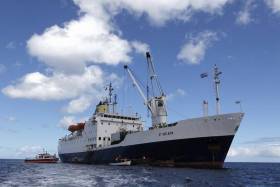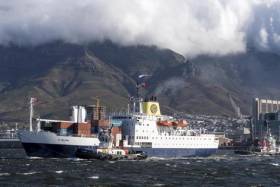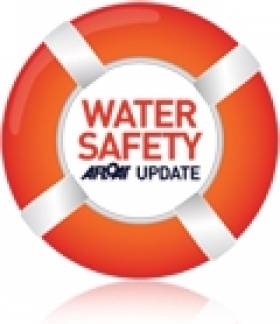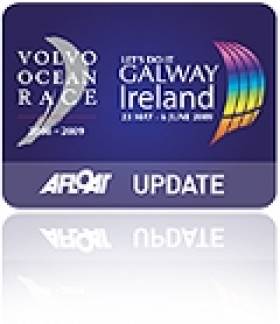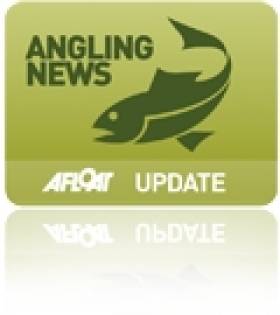Displaying items by tag: South Africa
RMS Ship Runs Out of Steam as St. Helena Island’s Airport takes Off
#Ports&Shipping - RMS St.Helena, the last ship from a mighty fleet that once bound Britain’s scattered empire together will arrive today (Monday, 29 January) after its final voyage to St Helena.
As the UK newspaper, The Times reports the isolated British overseas island territory in the Atlantic Ocean that for hundreds of years was accessible only by sea.
RMS St Helena, one of only two ocean-going vessels that still bear the title “Royal Mail Ship”, will end a final five-day journey from Cape Town, South Africa (haven departed last Wednesday) The unique occasion has been marked by pipe bands, ceremonies and an outpouring of nostalgia.
A flotilla of small boats, the British governor and a huge crowd will greet the ship as she anchors in the bay off Jamestown, the capital.
There will be parties aboard and tours of the ship that for 27 years was the island’s only…to read more click here. Note registration is required to continue further reading of the story.
Afloat.ie can update to confirm according to AIS tracking, that the St. Helena Line passenger-cargsoship is currently at anchorage offshore of the remote island. Next month the only scheduled sea connection will be served exclusively by a cargo-only containership.
During a reception held on board the RMS St. Helena's final (and only) farewell visit to London in 2016, the topic of the ship's replacement was discussed with Afloat from representatives of AW Ship Management. It was disclosed then that a German containership would be taken under contract to continue St. Helena operations based out of Cape Town and also maintain serving Ascension Island. The ship in question is the former Eemslift Christian, renamed Helena which is to begin the new cargo-only service. More on this to appear on Ports & Shipping news.
As for the Islanders or 'Saints' as they call themselves and tourists alike, they have since October last year had the option of taking commercial flights to and from South Africa to the island's first ever airport. The facility caused much controversary given delays arising from safety concerns of aircraft using the runway but were finally resolved. The airport is a game-changer in terms of tourism opportunities and developing new business links.
Among a programme of events to mark the historic farewell voyage on St. Helena, according to the island Government's website will start next week on Tuesday, 6 February, with a Thanksgiving Service at St James’ Church. The service starts at 7pm and all are invited to attend. Following the service the RMS crew will proceed to the Seafront for a Blessing.
A special RMS Open Day will be held on Friday, 9 February, which will allow the Saints a final opportunity to view the ship based on those who have already made a booking. The public viewing will permit access to the bridge overlooking the cargodeck, the passenger facilities and several cabins. Invariably this will prove to be an emotional day.
Celebrations on the Seafront will start at 3pm and will include a local market, RMS entertainment, an exciting performance by the RMS Amateur Dramatics Society and live music by various local bands. Festivities will continue until midnight.
The RMS St. Helena will depart for the very last time when a final voyage from St. Helena is on Saturday, 10 February and returning to the South African port. This will truly be an end of era not just for the Saints but as part of world maritime history.
Royal Mail Ship Embarks on Final Voyage to St Helena
#Ports&Shipping - RMS St Helena, a UK flagged Royal Mail Ship as previously reported on Afloat, that was once a lifeline to the outside world for St Helena is making its last voyage to the remote South Atlantic island where Napoleon died in exile.
According to Gazette News, RMS St Helena’s route for the last three decades is being phased out because a South African airline started a weekly commercial flight in October after the delayed opening of an airport on the volcanic island, and flights could become more frequent if there is demand.
Until last year, the “royal mail” vessel had been the only regular way to reach British-ruled St Helena for passengers who spent nearly a week at sea after departure from the South African city of Cape Town.
Ahead of the ship’s final departure from Cape Town on Wednesday, diplomats, tourism officials and crew members mingled at an on-board reception.
To read more of this historic farewell unique passenger-cargo voyage and photos click here.
NI Newlyweds Drown Off South Africa
#Tragedy - A couple from Northern Ireland have drowned in South Africa just days after their wedding, as RTÉ News reports.
The bodies of 28-year-old John Rodgers and his 26-year-old wife Lynette from Holywood, Co Down were found on Friday evening (24 October) some 200 metres apart in shallow surf on a beach near Plettenberg Bay in South Africa's Western Cape province.
It's believed that they got into difficulty while swimming on what was the first day of their honeymoon. Strong rip currents are common in an area known for rough seas.
RTÉ News has more on the story HERE.
Smartphone App Helps Boat Lost in Fog
#Smartphone - A yacht managed to avoid collision with a container ship off the coast of South Africa recently - thanks to a smartphone app.
As Yachting Monthly reports, Ian Engelbrecht and crew Ibolya Palko were delivering a catamaran from Cape Town to Durban when they were trapped in thick fog not far the coastline.
When their primary AIS system stopped working, Engelbrecht turned on a smartphone app called Boat Beacon as a way to alert them to any other ships in the vicinity.
The app did its job, alerting the pair to a container vessel travelling in the opposite direction, though they were unsure of what corrective action to take due to the poor visibility and not knowing the closest point of approach (CPA).
Despite this, collision was averted - and the incident has prompted the app developers to add a CPA bearing feature to their product.
Yachting Monthly has more on the story HERE.
Tourist Dies in Cape Town Charter Boat Capsize
#WATER SAFETY - Irish tourists headed to South Africa have been reminded of the dangers of the sea after a whale-watching vessel capsized near Cape Town at the weekend.
As BBC News reports, British tourist Peter Hyett and crewman John Roberts died when the catamaran Miroshga capsized off Hout Bay on the eastern side of the Cape Peninsula, near the popular seal colony of Duiker Island.
A number of the 39 passengers on board at the time were trapped in the vessel for almost four hours before they were freed by rescuers.
The seas off Hout Bay are a mecca for whale and seal watching, but are known to be rough, with hidden rocks below the surface. Great white sharks are also a regular sight in the waters, attracted by the seals.
But fellow skippers in the area reported fine weather and only slight swells at the time of the capsizing, according to iAfrica.com.
An investigation into the incident is being launched.
VOR Skipper Cammas Receives French Sporting Honour
Volvo Ocean Race skipper Franck Cammas has been presented with one of France’s most prestigious sporting honours.
The man in charge of the Groupama sailing team was awarded the Grand Prix de l’Académie des Sports in Paris recently, recognising his achievements in sailing in 2010.
These included his skippering of the 100ft trimaran Groupama 3 non-stop around the world in a record-breaking in 48 days, 7 hours, 44 minutes and 52 seconds.
Cammas is only the fifth sailor to be presented with the award, following Whitbread Round the World Race skipper Eric Tabarly, 1983 America’s Cup winner John Bertrand, solo sailor Isabelle Autissier and Alinghi team principal Ernesto Bertarelli.
But Cammas isn't resting on his laurels, as he's currently preparing with his team to compete in the next Volvo Ocean Race kicking off next month.
He will lead a crew of 11 sailors - including Kerryman Damian Foxall - on the 70ft monohull Volvo Open 70 Groupama 4 in the 39,000 nautical mile race, which is set to conclude in Galway next summer and will also involve Wexford sailor Justin Slattery, who is in the crew for Team Abu Dhabi.
The action starts in Alicante, Spain on 29 October with the first in-port race. The first leg to Cape Town then begins on 5 November.
Irish Anglers Win Big in South Africa
Ireland's angling team won the 2010 World Shore Championships in South Africa at the weekend.
The combined effort of the five-strong Irish squad was more than enough to see off the strong opposition of teams from Italy and Spain over the week-long competition in Langebaan, 120km north of Cape Town in the Western Cape.
Two Irish fisherman also placed in the top five of the individual table, with John O'Brien claiming silver while Timothy O'Sullivan came fourth.
Black Tie Finale to ISORA Season
Irish Sea Offshore sailing Chief Peter Ryan has circulated the Notice and Agenda for next Saturday's ISORA AGM at the National Yacht Club and told Ireland's biggest band of offshore crews to wear dinner jackets so they can vote on next year's sailing, watch Ireland play South Africa and attend the formal ISORA prize giving dinner all at the same waterfront venue.
The AGM takes place at 14.00 at the NYC. The rugby match is on at 17.30 and Ryan says if sailors are interested they can dress up in your tux and watch the match.
Immediately after the match at 19.45, the pre-dinner drinks reception will be held in the JB Room of the Dun Laoghaire club with complimentary sparkling wine and classical music by the Neptune Trio.
Dinner will be at 20.30 sharp to enable the prize giving to take place at 22.00 and finish of ceremonies by 23.00 latest. After this sailors can relax or dance the night away at the ISORA disco.
AGM papers are attached for download.



























